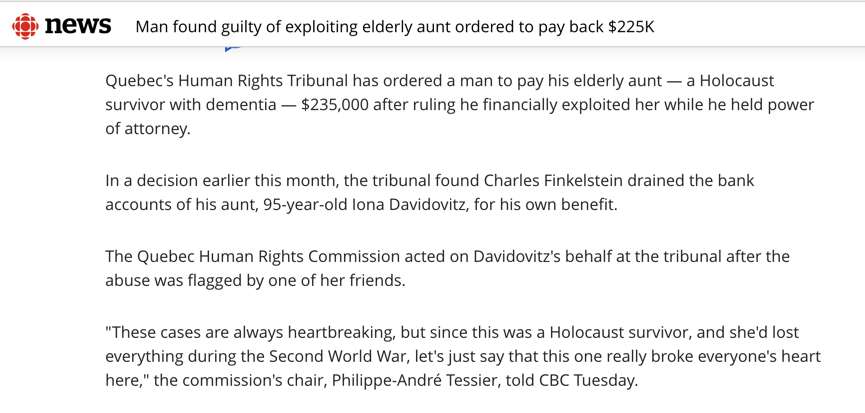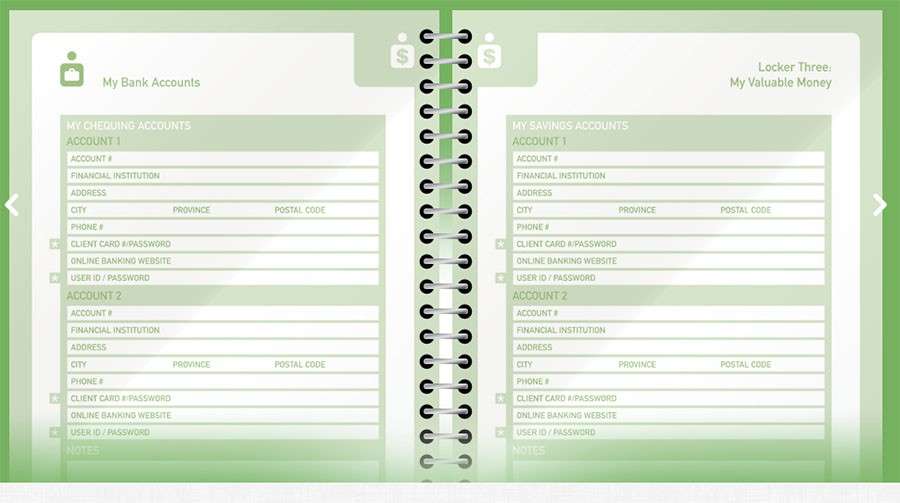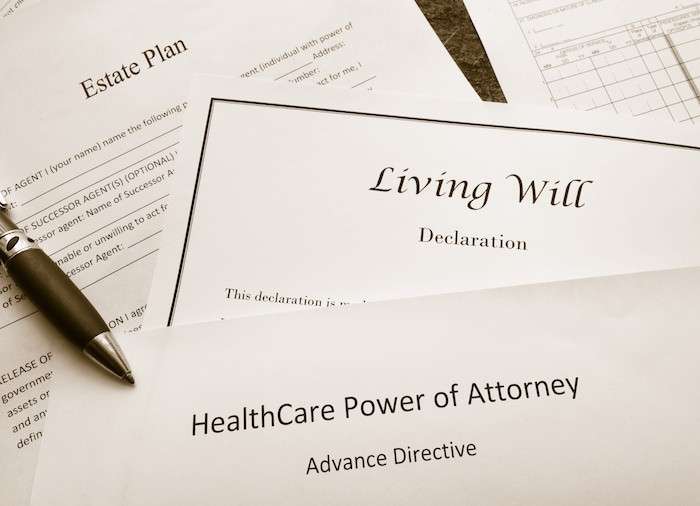A Financial Power of Attorney appoints somebody to take care of your financial affairs while you are alive, but usually after you have lost capacity.
This document should not be confused with either a Last Will and Testament (or simply a “Will”) or a Living Will.
A Last Will and Testament makes key appointments and describes the distribution of your estate after you have died.
A Living Will is a document that is also in effect while you are alive, but deals only with your health condition and medical treatment. It usually combines the naming of a Healthcare Proxy with an expression of the type of treatment you wish to receive through an Advance Directive.
Together, these three documents make up a complete Estate Plan in Canada.

What types of Power of Attorney are there?
The first classification is the Power of Attorney that directs your medical needs; a Healthcare Power of Attorney. Also known as a Healthcare proxy. In this document, you name a person to make medical decisions on your behalf. Most people when they talk about a Power of Attorney are not meaning a Healthcare document.
A Financial Power of Attorney is typically the document that people mean when they ask for a PoA. There are two broad classifications of Financial Power of Attorney; a General PoA and a Specific PoA.
The General Power of Attorney is set up to allow a named person to handle all of your financial affairs.
A Specific Power of Attorney is set up to handle a particular transaction. For example, if I was living overseas and needed somebody to sell my car for me back in Canada, I could create a specific Power of Attorney that would give my representative the powers to do this, but limiting the powers to this one transaction. This kind of document isn’t generally regarded as a part of an estate planning portfolio.
General Powers of Attorney can be further classified into one that comes into effect immediately, and one that comes into effect only when a future event occurs (usually, if you are incapacitated). This is called a “Springing Power of Attorney“.
The term Springing Power of Attorney is also mixed up with a Durable Power of Attorney. This is a document that “endures” your loss of capacity. A Durable PoA can technically be general, specific, immediate or springing.
Most people who come to us are looking for a document that will come into effect if they were to ever lose capacity. Most people refer to this as a Durable Power of Attorney, or an “Enduring Power of Attorney“, or “Continuing Power of Attorney“. So although technically the more accurate term is a Springing PoA, we go with a “Durable PoA” because this is what everybody calls it.
Is a Power of Attorney as important as a Will?
One of the most common questions we receive is
I know I need a Will, but do I also need a Power of Attorney?
We are all going to die. We all need a Will. But the Power of Attorney is only going to come into effect if you were to ever lose capacity. You may never find yourself in this position, and so it is possible that the document may never be used.
However, if you were to ever lose capacity the document is absolutely critical. And the document cannot be created after you have lost capacity. Think of it as an insurance policy. In fact, if you lose capacity and do not have a PoA in place, you are exposing your family to potential feuds, just like Casey Kasem.
Firstly, let us consider what we mean by “lost capacity”. This can take a number of different forms. You could be knocked off your bicycle and hospitalized. While in hospital you may need credit card bills paid, subscriptions, rent, utilities, investments handled. You would need somebody to just handle ongoing mail.
A Financial Power of Attorney can then become active and allow your representative to take care of your banking needs.
At the other end of the spectrum, supposing you were put into care, and you were diagnosed with Alzheimer’s. Your spouse may want to sell the house and move into something smaller, but they would be unable to do this because the documents would need you both to sign. But if you have lost capacity, you cannot sign. This means that your spouse would be stuck in the family home whether they like it or not, and be unable to sell it until you have passed away.
If you had a Financial Power of Attorney, your spouse would be able to sign on your behalf.
These are just a couple of scenarios, but there are countless others that demonstrate the value of a Power of Attorney document.
Who determines your capacity?
You are granting significant powers in a PoA, and sadly Power of Attorney abuse is rampant!!

There are two important conditions required for the Power of Attorney to work. You must have capacity when it is written and signed (usually determined by two independent witnesses.
You must have lost capacity for the document to come into effect. This is usually determined by two attending physicians.

How can I create a Power of Attorney?
There is no official format for a Power of Attorney. It must clearly state that the document is a Power of Attorney document, and that you are granting certain powers to a representative. The document must state when the powers will come into effect; what will trigger the document, and then it must be signed in the presence of two witnesses. Technically, this would meet the legal requirements of the Durable General Financial Power of Attorney.
But it is an extremely powerful legal document, and probably not one that you should try to write yourself. The document created at LegalWills.ca is about 8 pages and goes into significant detail to explain what can and cannot be done.
There are significant Provincial differences with a Power of Attorney document, so there is no such thing as a Canadian form. Rules also change over the years (BC completely overhauled their Power of Attorney rules a few years ago), so be very careful using any free standard blank form PoA’s.
You can prepare a Power of Attorney with a lawyer. The 2019 legal rates for a financial PoA are $150-$200 according to Canadian Lawyer Magazine.
Or you can use an interactive online service like the one at LegalWills.ca. Often a PoA is created together with a Last Will and Testament and Living Will, so it may be a more convenient approach to prepare all three together.
To write a Financial Power of Attorney using our service takes about 10 minutes and costs $29.95. We provide all options for General PoA’s including immediate, springing and durable Powers of Attorney. You can prepare one by clicking on the button below.
Who can witness the signing of a Power of Attorney?
The witnessing rules are quite consistent across different estate planning documents. Just as with your Last Will and Testament, a beneficiary cannot be a witness to the signing of the document, for a Power of Attorney your representative (sometimes referred to as your “attorney” although this is a confusing term so we try not to use it) cannot be a witness. Nobody who can gain from the contents of the document can witness the signing of the document.
Your witnesses can be any two independent adults, with the exception of the Province of Manitoba.
In Manitoba, a witness must be one of: a person registered or qualified to be registered to solemnize marriages in Manitoba; a judge, justice of the peace or magistrate in Manitoba; a qualified medical practitioner in Manitoba; a notary public for Manitoba; a lawyer entitled to practice in Manitoba; or a member of the R.C.M.P. or a police officer in a municipal police force in Manitoba.

For the signing procedure, you would gather the witness(es) together in a room. You should make a formal statement that you have gathered them to witness the signing of your Power of Attorney. They do not need to read the document or know its contents. They are only required to witness your signature.
You should initial each page in turn, in the bottom left corner of each page, and then sign your name in full on the last page, in full view of the witness(es). Each witness then in turn initials each page, in the bottom left corner of each page, and signs the last page. Everybody must stay present until all of the signing is complete.
There should only be one original of the Power of Attorney for everyone to sign. Copies can be created by photocopy. It is therefore a good idea to sign the original in blue ink, so that it is easily distinguishable from the photocopies. Do not sign the photocopies, as this will create duplicate originals which can be difficult to administer.
Does a financial Power of Attorney have to be notarized?
This is one of the most confusing aspects of the Power of Attorney because the answer is yes and no.
The legal requirement for a PoA is that it is signed in the presence of two witnesses, but you must think about the extent of the powers being granted by this document. It allows your representative to empty your bank accounts completely, so naturally, banks are keen to limit their exposure to PoA abuse.
Many banks therefore have created their own rules for accepting a Power of Attorney document. We know for example that Royal Bank of Canada and Bank of Montreal have requirements over and above the legal statutes. Specifically, they need to see the document notarized.
In addition, if your representative is likely to be handling real estate sales on your behalf, the land titles department would almost certainly want to see a notarized document. Many Provincial Land Titles offices state this as a requirement.
In practice this means that at least one of your witnesses would need to sign an Affidavit of Execution in the presence of a Notary, who would then stamp the Affidavit and attach it to the PoA. If the Power of Attorney has a sworn affidavit attached, most banks would accept the PoA appointment.
What do I do with my Power of Attorney once it’s signed?
Once you have signed the document in the presence of two witnesses, dated it, and possibly had a witness sign in the presence of a Notary, then you have created your legal Power of Attorney. At this point, there is no requirement to register it with any particular authority, however, if you are anticipating that your representative will be working with a particular bank or branch, there’s no harm in letting the bank know that the document has been created and giving them a copy for their files.
Otherwise, the document should simply be stored in a safe place that is known and accessible to your representative. You may even want to give the document to your representative in a sealed envelope. There should only be one original and any copies should be clearly marked as copies.
Can my appointment in the PoA conflict with my Will?
There is absolutely no relationship between your PoA appointment and your Will. In your Last Will and Testament you will name an “Executor”. This person has the responsibility to administer your “estate” (financial assets) after you have died. Your Executor can be the same person as your representative appointed in your PoA, or they can be a different person.
Your Last Will and Testament and your Power of Attorney are never in effect at the same time. Your PoA is active while you are alive, but you have lost capacity. The moment you die, the PoA is cancelled. Your Will does absolutely nothing all the time you are alive, and only comes into effect the moment you die (technically, after it has been probated).
The two documents do not overlap and cannot conflict with each other.

Are there Provincial differences in a Power of Attorney?
Absolutely, in fact more so than any other estate planning document. The laws surrounding a Will aren’t dramatically different from one Province to another (with the possible exception of Quebec), but the laws describing a Power of Attorney are significantly different.
For example, in Manitoba, the signing requirements are unique. In Quebec, an Enduring PoA is created through a “Protection Mandate”. Healthcare PoA’s in BC are called Representation Agreements.
Be careful when using a form or service to prepare a PoA that you are using something designed specifically for your Province.
Can I prepare a Power of Attorney for somebody who has lost capacity?
No, not very easily. A Power of Attorney is a document that is written while you are healthy and you have capacity, to come into effect after you lose capacity. The nice thing about this approach is that you can decide who will handle your affairs on your behalf.
Trying to assume control of somebody’s finances is a recipe for family conflict. Often this involves a child attempting to manage their elderly parent’s financial affairs, but can often result in acrimony between siblings.
It is not impossible to obtain a “conservatorship” for an aging parent, but it is not as simple as creating a Power of Attorney.
Do I need to create any other documents?
If you are creating a general Power of Attorney giving your representative control over all of your financial affairs in the event of incapacity, then we would recommend preparing an inventory of your financial assets. We recommend this as a step after you have created your Will as an aid to your Executor, but it is equally important for a PoA.
At LegalWills.ca we provide a service to help with this through MyLifeLocker. The service guides you through the process of documenting your important contacts and also creating an inventory of your assets.

Does a Power of Attorney survive my death?
No. The moment you die, your PoA is cancelled and your Will comes into effect. In some respects the Executor of your Will has a similar responsibility to the representative name in your PoA. They have to pay bills, taxes, handle ongoing subscriptions, manage credit cards and bank accounts. But the moment you die, your Executor takes over, and your PoA is immediately cancelled.
How do I cancel a Power of Attorney?
If you still have capacity you can cancel a PoA by simply destroying the document. It is theoretically possible to create a PoA revocation document, but in practice, it just makes sense to shred the document.
A PoA that is in effect because you have now lost capacity will only be cancelled if you die, or if your representative is removed from their position, usually because of malpractice.
Create your Enduring, General, Financial Power of Attorney now.
Hopefully this article has addressed some of the confusing aspects of a PoA. If you have any questions about the document, please ask in the comments below and we will be happy to help.
I am hoping that we have also explained why it is important for everybody to have this document in their estate planning portfolio. If you are preparing a Will, please take the time to also prepare a financial Power of Attorney. You can do this by clicking the button below.
- Probate in Canada – What it is, what it costs, how to reduce fees. - January 6, 2025
- All about Trusts – how to include a Trust in your Will - June 9, 2022
- The Holographic Will – what is it and when should you use one? - May 18, 2022












